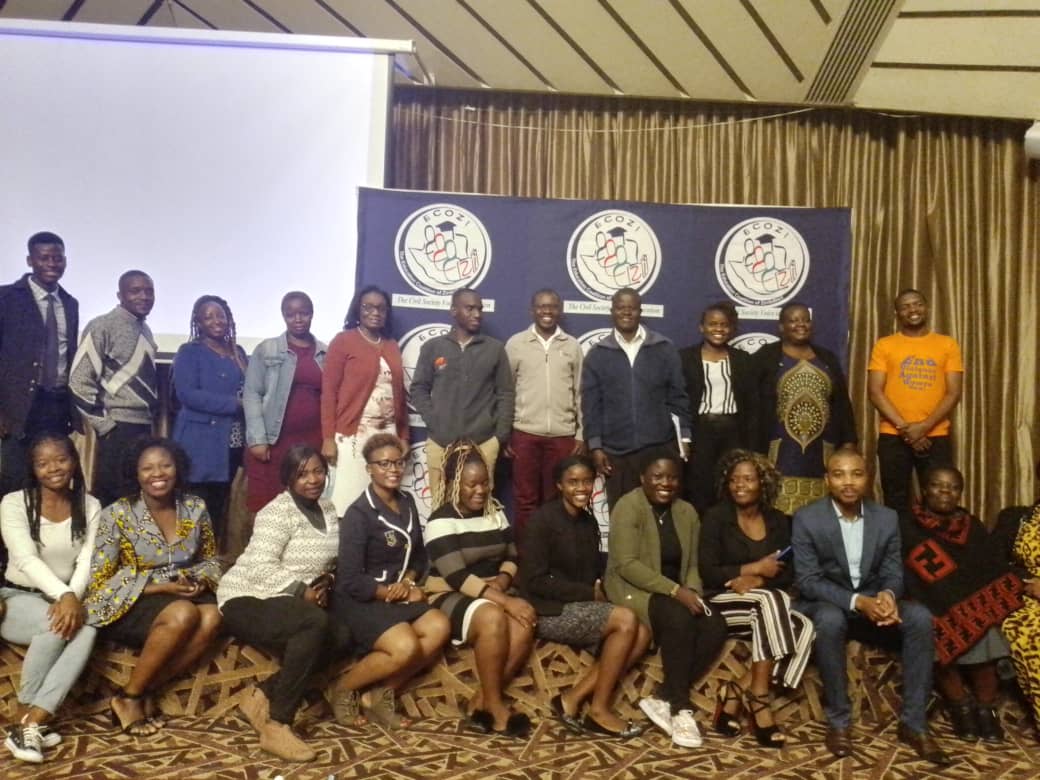|
Getting your Trinity Audio player ready...
|
Members of the Education Coalition of Zimbabwe (ECOZI) underwent a one-day training workshop to build their capacities in policy advocacy research and review.
The training workshop was held at the Monomotapa Hotel on Monday 16th May 2022 with participants drawn from ECOZI member organisations.
“The purpose of this training is to train participants on the public policy advocacy in Zimbabwe and this will include various topics such as the Policy Cycle, Policy-Making Process, Policy Frameworks in the Education Sector, Key issues from the Zimbabwean Education Policy and Gaps, Role of CSOs in the policymaking process, and Policy Advocacy (definition and methods),” said Mr. Clemence Nhliziyo, ECOZI Programmes Manager.
The training methodology was interactive as the training consultant ensured that knowledge was not only disseminated but accurately perceived and understood by the participants.
In order to ensure this, the facilitator engaged participants in discussions and kept the sessions open for feedback, questions, and comments. These discussions and interactive sessions were supported through training material such as the PowerPoint presentation which was shared with all participants at the beginning of the session and handouts on selected sections for discussion. A flipchart was also made available by ECOZI for jotting down key discussion points. Recaps after each section ensured that participants understood the content of the presentations.
Some of the organisations represented included the Zimbabwe National Council for the Welfare of Children (ZNCWC), Say What, Zimbabwe Teachers Association (ZIMTA), the Campaign for Female Education (CAMFED), Plan International, Progressive Teachers Union of Zimbabwe, Shamwari yeMwanasikana, Deaf Zimbabwe Trust and Education for Zimbabwe, just to mention a few.
The facilitator was Dr. Getrude Dadirai Gwenzi from the University of Zimbabwe, who is currently the Coordinator of the Master’s Program in Social Policy as well as a Lecturer in Social Work (Social Policy) and an experienced social worker, policy researcher and educator with a Doctorate in Sociology and Social Policy from Lingnan University in Hong Kong as well as a Master’s degree in Social Policy from University College Cork in Ireland.
She also has a Bachelor’s degree in Social Work from Fort Hare University in South Africa. She has conducted workshops and training both locally and internationally.
She gave the definition of public policy and noted the difference between public policy and social policy. This section went through the policymaking process, including the policy cycle, main models of policymaking, and frameworks for public policy in Zimbabwe.
Participants were also made aware of the policymaking structures in Zimbabwe and were taken through a discussion on what models of policymaking and ideologies are used in the Zimbabwean context. Participants engaged well with this topic, including online participants who shared their comments via the chat function on Zoom.
One comment was made by Dr. Siwela from Education for Zimbabwe who noted the use of Western models of policymaking in Zimbabwe and the lack of local and new models from Zimbabwe.
Dr. Gwenzi explained that until stakeholders decolonise policymaking structures and create local, culturally relevant models, the country would be forced to use existing models from the West.
The second presentation was on Research Methods for Policy and participants were introduced to the main methods of policy analysis and review. What was key in this section was to equip participants with simple research tips to allow them to conduct basic policy analysis and review.
Participants were introduced to frameworks such as the Problem Tree Analysis, RAPID framework, Cost-Benefit Analysis (CBA), and Evidence-Based Approach (EBA).
Mr. Nhliziyo said that was basically introductory and revealed that more training will be needed to provide a more in-depth workshop on each of these. Participants were eager to know how they can begin to do policy analysis and this was sufficient for them to at least know how to read a policy document, what to look for and at what stage policy analysis and evaluation take place. Evidence-based approaches were found to be more effective and participants as members of CSOs were urged to collect data that will assist them in their advocacy efforts. A simple research planning tool was provided to aid organisations in this.






